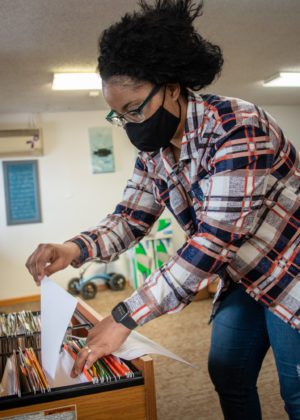
Cordova Family Resource Center is facing a possible 33% cut to its victim services funding, even as demand for those services is rising. This $80,435.85 cut could impact the center’s ability to maintain its 24-hour helpline, to respond to domestic violence calls and to offer victims of violence shelter services, hospital accompaniment and assistance finding legal support. CFRC’s staff would be reduced from the equivalent of 2.75 full-time employees to the equivalent of 1.25 full-time employees.
If the proposed cuts are not reversed or offset, CFRC’s victim services capacity would be significantly reduced beginning around the end of July.
“We’d have to make some severe changes,” CFRC Executive Director Nicole Songer said.
This would also burden other local service providers. CFRC members participate in the Cordova Police Department’s Sexual Assault Response Team, and are able to provide assistance to victims that the department cannot, Police Chief Nate Taylor said. Without the partnership of CFRC, the workload placed on the department’s four officers would be increased.
On April 1, CFRC and other victim services organizations were told to expect significant cuts for the 2022 fiscal year due to a reduction in funding available via the Victims of Crime Act. Established by the federal government in 1984, VOCA disburses funds to the states to assist victims of crime. The VOCA Crime Victims Fund is principally financed by fines and penalties paid by federal offenders, by forfeited appearance bonds and by special assessments paid by offenders. In 2019, the fund’s balance was $6.35 billion, and in 2020 it remained over $6 billion, according to a Congressional Research Service report. However, the balance of the fund had dropped by nearly $9 billion from 2017-2021, according to a letter by Sen. Patrick Leahy, D-Vt., chair of the Senate Committee on Appropriations, and by Sen. Jeanne Shaheen, D-N.H. If changes aren’t made, the fund could be entirely depleted within five years, according to a report by the nonprofit National Network to End Domestic Violence.
CFRC does not receive VOCA funding directly. VOCA funding is directed to the Alaska Department of Public Safety’s Council on Domestic Violence and Sexual Assault. CFRC then applies for grant funding from the council.

Though Congress released larger-than-average sums from the Crime Victims Fund during 2015-2018, the fund’s plunging balance is due mainly to a reduction in deposits, according to a report by the National Network to End Domestic Violence. As prosecutorial strategies have shifted over time, resulting in more non-prosecution agreements and deferred prosecution agreements, fewer penalties and fines have been deposited into the fund.
The VOCA Fix to Sustain the Crime Victims Fund Act of 2021 provides a potential solution to this shortfall in deposits, making the Crime Victims Fund eligible to receive revenues from non-prosecution agreements and deferred prosecution agreements. Revenues from these agreements currently go to the U.S. Treasury General Fund.
With vigorous support from the National Network to End Domestic Violence and other victim services organizations, the VOCA Fix Act passed the U.S. House March 17 and was received in the Senate the following day. CFRC also supports the VOCA Fix Act as a potential solution, said Pete Hoepfner, president of the CFRC Board of Directors.
“Providing this fix for VOCA funds will allow the state of Alaska to continue to meet the immediate needs of survivors,” said Sen. Lisa Murkowski, R-Alaska. “I continue to be concerned that the COVID-19 crisis has led to an increase in cases of domestic violence, sexual assault and child abuse throughout the state. Moving forward, we must continue to strengthen VOCA programs’ abilities to serve survivors and their communities.”
Songer also sees a potential solution in Gov. Mike Dunleavy’s proposal to use $1.02 billion in American Rescue Plan Act funds for discretionary pandemic relief efforts. Of those funds, $6 million would be earmarked to address the domestic violence impacts of the pandemic.
April 9, CFRC staff and supporters testified before the Alaska House Finance Committee regarding the possible funding cut to the organization. The organization has received some support from Alaska legislators. Sen. Gary Stevens, R-Kodiak, said he hoped the state legislature would be able to address the situation. Murkowski’s office has also been “very responsive” regarding CFRC’s situation, Hoepfner said. Songer suggested that citizens concerned about the cuts contact the offices of legislators like Murkowski, Stevens and Rep. Louise Stutes, R-Kodiak.
Victim services funding cuts do not directly affect CFRC’s prevention services, which include its Girls on the Run athletic and personal development events, its BIONIC youth program and other services aimed at changing social norms through education.





